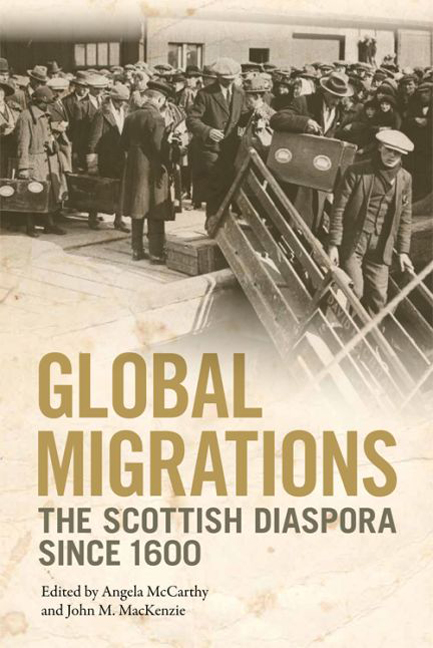Book contents
- Frontmatter
- Contents
- List of Figures and Tables
- Notes on the Contributors
- Acknowledgements
- A Tribute to Sir Tom Devine
- 1 Introduction-Global Migrations: The Scottish Diaspora since 1600
- 2 ‘As Hewers of Wood, and Drawers of Water’: Scotland as an Emigrant Nation, c. 1600 to c. 1800
- 3 ‘You Have Only Seen the Fortunate Few and Draw Your Conclusion Accordingly’: Behavioural Economics and the Paradox of Scottish Emigration
- 4 Scottish Diasporas and Africa
- 5 ‘Have the Scotch no Claim upon the Cherokee?’ Scots, Indians and Scots Indians in the American South
- 6 Conflicts of Interest, Crises of Conscience: Scots and Aboriginal People in Eastern Australia, 1830s–1861
- 7 The Importance of Scottish Origins in the Nineteenth Century: James Taylor and Ceylon Tea
- 8 ‘Our Old World Diff'rences are Dead’: The Scottish Migrant Military Tradition in the British Dominions during the First World War
- 9 ‘Part of my Heritage’: Ladies’ Pipe Bands, Associational Culture and ‘Homeland’ Identities in the Scottish Diaspora
- 10 Understanding Scottishness among Sojourners, Settlers and Descendants in Hong Kong and New Zealand
- 11 Encountering an Imaginary Heritage: Roots Tourism and the Scottish Diaspora
- 12 Home is where the Heart is: Affinity Scots in the Scottish Diaspora
- 13 What Scottish Diaspora?
- 14 Afterword
- Index
2 - ‘As Hewers of Wood, and Drawers of Water’: Scotland as an Emigrant Nation, c. 1600 to c. 1800
Published online by Cambridge University Press: 23 September 2017
- Frontmatter
- Contents
- List of Figures and Tables
- Notes on the Contributors
- Acknowledgements
- A Tribute to Sir Tom Devine
- 1 Introduction-Global Migrations: The Scottish Diaspora since 1600
- 2 ‘As Hewers of Wood, and Drawers of Water’: Scotland as an Emigrant Nation, c. 1600 to c. 1800
- 3 ‘You Have Only Seen the Fortunate Few and Draw Your Conclusion Accordingly’: Behavioural Economics and the Paradox of Scottish Emigration
- 4 Scottish Diasporas and Africa
- 5 ‘Have the Scotch no Claim upon the Cherokee?’ Scots, Indians and Scots Indians in the American South
- 6 Conflicts of Interest, Crises of Conscience: Scots and Aboriginal People in Eastern Australia, 1830s–1861
- 7 The Importance of Scottish Origins in the Nineteenth Century: James Taylor and Ceylon Tea
- 8 ‘Our Old World Diff'rences are Dead’: The Scottish Migrant Military Tradition in the British Dominions during the First World War
- 9 ‘Part of my Heritage’: Ladies’ Pipe Bands, Associational Culture and ‘Homeland’ Identities in the Scottish Diaspora
- 10 Understanding Scottishness among Sojourners, Settlers and Descendants in Hong Kong and New Zealand
- 11 Encountering an Imaginary Heritage: Roots Tourism and the Scottish Diaspora
- 12 Home is where the Heart is: Affinity Scots in the Scottish Diaspora
- 13 What Scottish Diaspora?
- 14 Afterword
- Index
Summary
THIS ATTEMPT TO RETHINK how early modern Scottish emigration might be conceptualised began life as part of a conference which explored the theme of whether the movement overseas of its people worked to Scotland's profit or to its loss. Leaving aside for a moment the entirely legitimate concern that such a complex human phenomenon cannot be so easily reduced to a simple dichotomy, there is little doubt that contemporaries understood the significance of the migrations which seemed such a recurrent feature of Scottish society between the 1603 and 1801 unions. If many commentators at the time wrestled with what to make of the propensity of Scots for mobility, it is unsurprising that some chose to emphasise the positive or negative consequences. In this sense at least, framing the topic in terms of ‘profit’ or ‘loss’ is perhaps less anachronistic than might at first seem the case. Take, for example, the sentiments expressed in a pamphlet published in Edinburgh in 1695. Ostensibly, the tract concerned itself with recent trends in the lucrative Europe-to-Asia trades. In explaining Scotland's international standing, the author offered a blunt assessment of the kingdom's experience of emigration since the uniting of the Scottish and English crowns. The conclusion was unequivocal. Despite the migration since the early 1600s of tens of thousands to Ulster, the Scandinavian kingdoms, the Polish–Lithuanian Commonwealth, the Dutch Republic, England and her Atlantic colonies, Scotland had not prospered – the opposite in fact. The pamphlet's preface concluded: ‘we had some who raised their fortunes … yet still we have been hitherto advancing our neighbours, but securing no colonies, or settlement for ourselves … as hewers of wood, and drawers of water.’
The powerful biblical image drawn from Joshua 9:23 of a faithless people cursed to be forever slaves to others chosen by God would have been immediately clear to any Scot capable of reading the pamphlet in the first place. The laying down of a profound spiritual question mark over a society forced into the large-scale dispersal of its people points to the need to better recapture the religious and rhetorical discourses, alongside the better known socio-economic explanations, by which Scots sought to make comprehensible the departure of so many.
- Type
- Chapter
- Information
- Global MigrationsThe Scottish Diaspora since 1600, pp. 23 - 45Publisher: Edinburgh University PressPrint publication year: 2016



